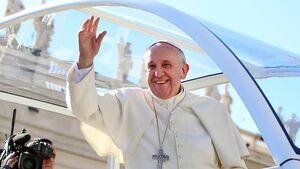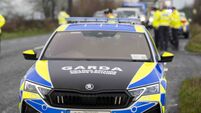Herald Opinion: From Knock to Croke Park: Memories of the Pope

Pope Francis. His passing leaves a space that will not be easily filled.
We all woke up on Easter Monday to the news that Pope Francis had died. Regardless of your level of devotion, or even your faith, it’s fair to say that the 266th Pope had an impact on all our lives. His passing led to a profound period of reflection for many and mourning for others, as we considered the influence the Argentine Jesuit had on the world we live in.
In Ireland, a nation with a long and complicated history with the Catholic Church, Pope Francis was seen not only as a spiritual leader but also as a voice of compassion, humility, and reform. His death prompted an outpouring of tributes from Irish leaders, faith communities, and the wider public, each acknowledging his legacy of peace, reconciliation, and unwavering commitment to the common good.
Francis was an advocate for social justice, for care of the environment, and for the dignity of the marginalised. He had no time for the trappings of power or prestige. Who could ever forget the striking image of the Pope travelling in a modest blue Skoda Rapid, its registration number 182 D 9093.
So many images from that visit to Ireland remain vivid in my mind, but one stands out above all: the scene at Knock Airport as the rain came down and Pope Francis prepared to board his Aer Lingus plane, fittingly named St Aidan. Amid the downpour, Sligo woman Audrey Elliott, then working in the Knock Airport Marketing Department, seized a once-in-a-lifetime opportunity. With a black permanent marker and a Mayo jersey in hand, she convinced the Pope to sign his name — “Francis” — across the red band between the GAA and Mayo crests. A simple gesture, a priceless souvenir, and arguably the greatest Mayo marketing coup of all time.
When Pope Francis visited Ireland in 2018, I was fortunate to be among those in attendance at Croke Park. We arrived early, beginning the day, like so many others, at the Croke Park Hotel. That day, it was just a meal, no pints, and a sense of excitement that felt different from a match day.
As we crossed over to the stadium, the atmosphere was electric but reverent. I regret not keeping my ticket, but I do have a photo, and for the record, I was sitting in Section 516, Row D, Seat 12 — in the Davin Stand Premium Level, with a perfect view of the evening’s events.
One of the standout moments for me was watching a friend of mine, Tricia Nolan, and her school choir from Ballymun perform brilliantly that night. But it was another young voice that stole the show and captured the spirit of the evening - Alison Nevin, a young Traveller girl from Dublin, who broke protocol in the best possible way. She had been instructed not to take photos, but had cleverly hidden her phone up her sleeve. When she approached Pope Francis, she asked for a selfie.
True to form, the Pope smiled warmly and obliged, much to the delight of the crowd. The stadium erupted into cheers and applause — a moment of pure humanity, a simple, joyful exchange that said more about Pope Francis than a thousand official speeches could.
That was his way, wherever he went. His humanity shone through. He was exactly what the tired Catholic Church needed at that moment — new, different, yet somehow returning to the core values the Church was supposed to stand for - inclusion, compassion, and family.
He followed a conservative Pope, who himself succeeded a long-serving and once-popular pontiff from Poland, Pope John Paul II, who became increasingly conservative as the world changed around him. Francis, however, was very much a Pope for his time. He spoke to a modern world without losing the essential message of faith, love, and service. It will be fascinating to see who his successor will be — and how they will take up the role at such a critical time.
Francis' papacy was not without its immense challenges. He worked to make the Catholic Church more inclusive and compassionate while grappling with its darkest scandals. In Dublin, addressing survivors of clerical abuse, he said: "I ask forgiveness for the times in which the Church did not respond with compassion to the suffering of many." He went further, declaring: "With shame and repentance, we beg forgiveness for the abuse perpetrated in Ireland by members of the Church."
There was a sincerity in him that was unmistakable. You could feel that Ireland's pain had touched him deeply — and that he understood the weight of history and betrayal that hung over so many. He reached out with genuine humility to those who felt abandoned, and in doing so, won the respect and affection of many who had long turned away from the Church.
Pope Francis reminded us all that leadership is not about grand statements or displays of authority, but about kindness, courage, and the willingness to walk alongside the broken and the hopeful alike. His passing leaves a space that will not be easily filled — but his legacy, one of humanity, hope, and sincerity, will endure.





